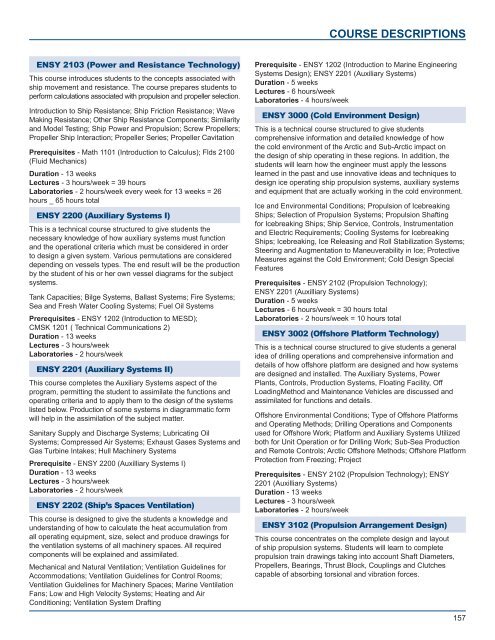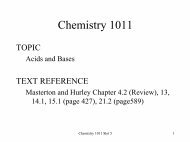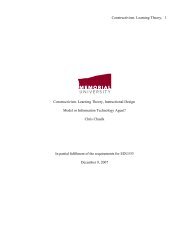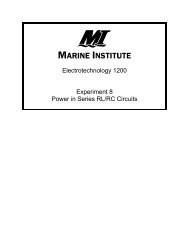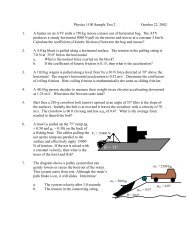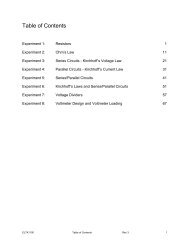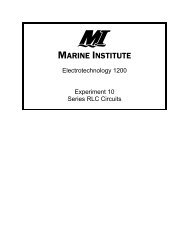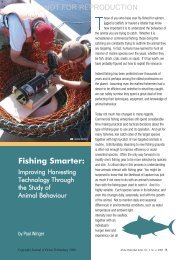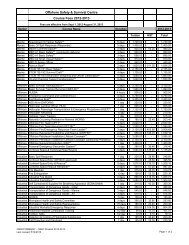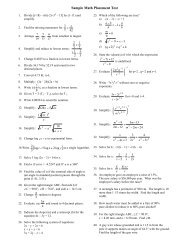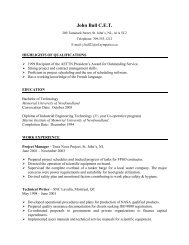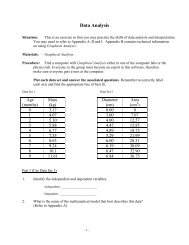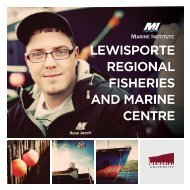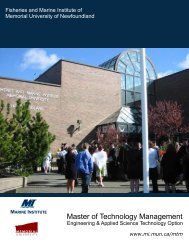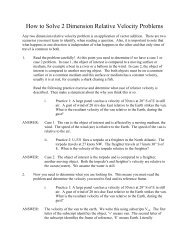Academic Calendar - Fisheries and Marine Institute - Memorial ...
Academic Calendar - Fisheries and Marine Institute - Memorial ...
Academic Calendar - Fisheries and Marine Institute - Memorial ...
You also want an ePaper? Increase the reach of your titles
YUMPU automatically turns print PDFs into web optimized ePapers that Google loves.
COURSE DESCRIPTIONS<br />
ENSY 2103 (Power <strong>and</strong> Resistance Technology)<br />
This course introduces students to the concepts associated with<br />
ship movement <strong>and</strong> resistance. The course prepares students to<br />
perform calculations associated with propulsion <strong>and</strong> propeller selection.<br />
Introduction to Ship Resistance; Ship Friction Resistance; Wave<br />
Making Resistance; Other Ship Resistance Components; Similarity<br />
<strong>and</strong> Model Testing; Ship Power <strong>and</strong> Propulsion; Screw Propellers;<br />
Propeller Ship Interaction; Propeller Series; Propeller Cavitation<br />
Prerequisites - Math 1101 (Introduction to Calculus); Flds 2100<br />
(Fluid Mechanics)<br />
Duration - 13 weeks<br />
Lectures - 3 hours/week = 39 hours<br />
Laboratories - 2 hours/week every week for 13 weeks = 26<br />
hours _ 65 hours total<br />
ENSY 2200 (Auxiliary Systems I)<br />
This is a technical course structured to give students the<br />
necessary knowledge of how auxiliary systems must function<br />
<strong>and</strong> the operational criteria which must be considered in order<br />
to design a given system. Various permutations are considered<br />
depending on vessels types. The end result will be the production<br />
by the student of his or her own vessel diagrams for the subject<br />
systems.<br />
Tank Capacities; Bilge Systems, Ballast Systems; Fire Systems;<br />
Sea <strong>and</strong> Fresh Water Cooling Systems; Fuel Oil Systems<br />
Prerequisites - ENSY 1202 (Introduction to MESD);<br />
CMSK 1201 ( Technical Communications 2)<br />
Duration - 13 weeks<br />
Lectures - 3 hours/week<br />
Laboratories - 2 hours/week<br />
ENSY 2201 (Auxiliary Systems II)<br />
This course completes the Auxiliary Systems aspect of the<br />
program, permitting the student to assimilate the functions <strong>and</strong><br />
operating criteria <strong>and</strong> to apply them to the design of the systems<br />
listed below. Production of some systems in diagrammatic form<br />
will help in the assimilation of the subject matter.<br />
Sanitary Supply <strong>and</strong> Discharge Systems; Lubricating Oil<br />
Systems; Compressed Air Systems; Exhaust Gases Systems <strong>and</strong><br />
Gas Turbine Intakes; Hull Machinery Systems<br />
Prerequisite - ENSY 2200 (Auxilliary Systems I)<br />
Duration - 13 weeks<br />
Lectures - 3 hours/week<br />
Laboratories - 2 hours/week<br />
ENSY 2202 (Ship’s Spaces Ventilation)<br />
This course is designed to give the students a knowledge <strong>and</strong><br />
underst<strong>and</strong>ing of how to calculate the heat accumulation from<br />
all operating equipment, size, select <strong>and</strong> produce drawings for<br />
the ventilation systems of all machinery spaces. All required<br />
components will be explained <strong>and</strong> assimilated.<br />
Mechanical <strong>and</strong> Natural Ventilation; Ventilation Guidelines for<br />
Accommodations; Ventilation Guidelines for Control Rooms;<br />
Ventilation Guidelines for Machinery Spaces; <strong>Marine</strong> Ventilation<br />
Fans; Low <strong>and</strong> High Velocity Systems; Heating <strong>and</strong> Air<br />
Conditioning; Ventilation System Drafting<br />
Prerequisite - ENSY 1202 (Introduction to <strong>Marine</strong> Engineering<br />
Systems Design); ENSY 2201 (Auxiliary Systems)<br />
Duration - 5 weeks<br />
Lectures - 6 hours/week<br />
Laboratories - 4 hours/week<br />
ENSY 3000 (Cold Environment Design)<br />
This is a technical course structured to give students<br />
comprehensive information <strong>and</strong> detailed knowledge of how<br />
the cold environment of the Arctic <strong>and</strong> Sub-Arctic impact on<br />
the design of ship operating in these regions. In addition, the<br />
students will learn how the engineer must apply the lessons<br />
learned in the past <strong>and</strong> use innovative ideas <strong>and</strong> techniques to<br />
design ice operating ship propulsion systems, auxiliary systems<br />
<strong>and</strong> equipment that are actually working in the cold environment.<br />
Ice <strong>and</strong> Environmental Conditions; Propulsion of Icebreaking<br />
Ships; Selection of Propulsion Systems; Propulsion Shafting<br />
for Icebreaking Ships; Ship Service, Controls, Instrumentation<br />
<strong>and</strong> Electric Requirements; Cooling Systems for Icebreaking<br />
Ships; Icebreaking, Ice Releasing <strong>and</strong> Roll Stabilization Systems;<br />
Steering <strong>and</strong> Augmentation to Maneuverability in Ice; Protective<br />
Measures against the Cold Environment; Cold Design Special<br />
Features<br />
Prerequisites - ENSY 2102 (Propulsion Technology);<br />
ENSY 2201 (Auxilliary Systems)<br />
Duration - 5 weeks<br />
Lectures - 6 hours/week = 30 hours total<br />
Laboratories - 2 hours/week = 10 hours total<br />
ENSY 3002 (Offshore Platform Technology)<br />
This is a technical course structured to give students a general<br />
idea of drilling operations <strong>and</strong> comprehensive information <strong>and</strong><br />
details of how offshore platform are designed <strong>and</strong> how systems<br />
are designed <strong>and</strong> installed. The Auxiliary Systems, Power<br />
Plants, Controls, Production Systems, Floating Facility, Off<br />
LoadingMethod <strong>and</strong> Maintenance Vehicles are discussed <strong>and</strong><br />
assimilated for functions <strong>and</strong> details.<br />
Offshore Environmental Conditions; Type of Offshore Platforms<br />
<strong>and</strong> Operating Methods; Drilling Operations <strong>and</strong> Components<br />
used for Offshore Work; Platform <strong>and</strong> Auxiliary Systems Utilized<br />
both for Unit Operation or for Drilling Work; Sub-Sea Production<br />
<strong>and</strong> Remote Controls; Arctic Offshore Methods; Offshore Platform<br />
Protection from Freezing; Project<br />
Prerequisites - ENSY 2102 (Propulsion Technology); ENSY<br />
2201 (Auxilliary Systems)<br />
Duration - 13 weeks<br />
Lectures - 3 hours/week<br />
Laboratories - 2 hours/week<br />
ENSY 3102 (Propulsion Arrangement Design)<br />
This course concentrates on the complete design <strong>and</strong> layout<br />
of ship propulsion systems. Students will learn to complete<br />
propulsion train drawings taking into account Shaft Diameters,<br />
Propellers, Bearings, Thrust Block, Couplings <strong>and</strong> Clutches<br />
capable of absorbing torsional <strong>and</strong> vibration forces.<br />
157


